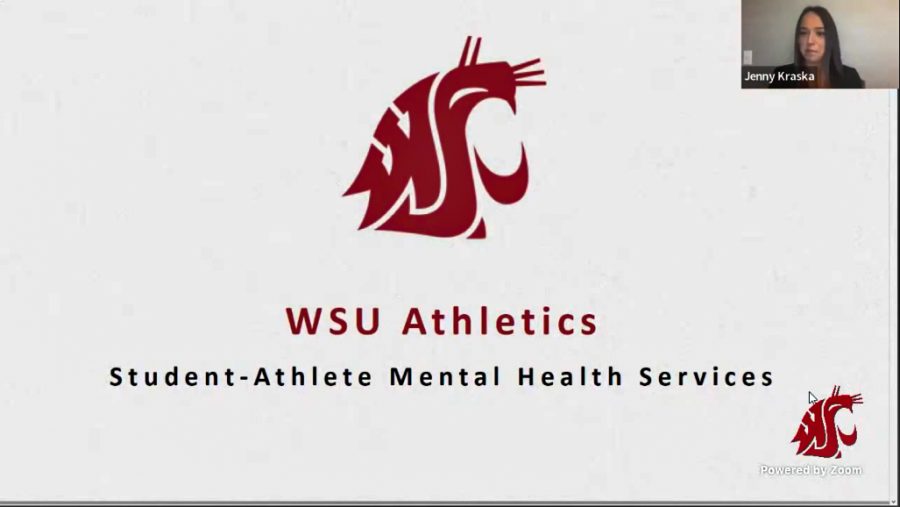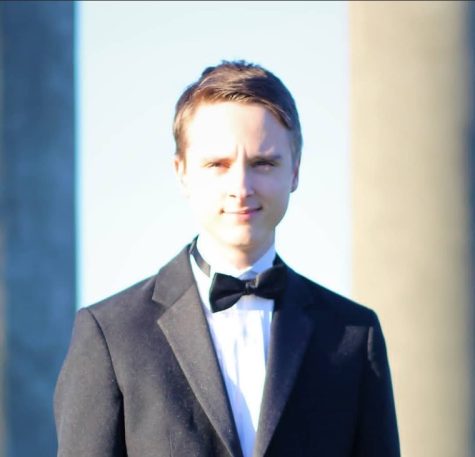Board of Regents address student-athlete mental health
WSU has lowest number of clinicians on athletic staff in Pac-12
Jenny Kraska, athletics postdoctoral psychology fellow, said starting this year, a session limit for counseling has been imposed for student-athletes.
January 22, 2022
One WSU staff member said during the Board of Regents meeting Thursday that mental health concerns such as anxiety and depression were higher in the spring and fall of 2020 than in previous years among student-athletes, with the pandemic as a significant cause.
“Student-athletes have some unique stressors that the general students may not face, including the high demand of their sport and balancing sports and academics and their outside life,” said Jenny Kraska, athletics postdoctoral psychology fellow.
Representatives from WSU Athletics spoke to the Board of Regents about the issue during their Thursday meeting. Kraska said mental health services are underutilized by student-athletes compared to other students.
Kraska said as a former student-athlete, she understands the attitude toward mental health for a lot of student-athletes is that they should suck it up and not let their mental health issues affect them.
“Oftentimes, there’s this kind of belief that they could be weak or that seeking therapy or treatment for mental health could impact how their team views them, how their coach views them, hold it against them in some way,” she said.
Kraska said part of how people can reduce the stigma against mental health is to talk about it and normalize seeking help. The WSU Crisis Line is one resource available to students.
Kraska said she attended a monthly mental health coordination consultation group as a representative of WSU, along with representatives of the other Pac-12 schools, to discuss their mental health programs with one another.
“We talk about the programs we’re doing, the services we’re providing, just to get ideas from each other, consult with one another, and just make sure we’re adapting to the rapidly changing world,” she said.
Because there is an increase in demand, Kraska said she would like to see more staff equipped to handle student-athletes’ mental health. Currently, she is the only full-time clinician on staff in the athletics departments; this is the lowest number in the Pac-12.
“We want to be able to meet where the other Pac-12 schools are at right now,” she said. “The average is 2-3 full-time clinicians.”
Kraska said starting this year, a session limit for counseling has been imposed for student-athletes, partially due to the staffing shortages they are facing.
“We’re following a general 12 session rule,” she said. “That’s at the student council center as well. However, we are able to kind of manage it on a case-by-case basis.”
Kraska said they can extend the 12 sessions if there is a student-athlete who needs more mental health help than others.
One of the best things that can be done to remove the stigma from mental health care is for student-athletes to meet those providing mental health treatment early on, she said.
“Previous to this academic year because there was more staff, the athletes were required as part of their pre-participation physical and exam, they’re required to meet with one of the mental health physicians,” Kraska said. “Because of the staff shortage, there hasn’t been a lot of time to do that.”
In addition, Shelby McKay, associate director of athletics, staff and student-athlete development, said she has noticed a strong culture of student-athletes wanting to talk about mental health, which is beneficial to those providing mental health services on campus.
“I have plenty of students who come to me saying, ‘Who is that person that I go to to help talk about my mental health concerns?’, and so it’s easy to direct them,” McKay said. “They’re not shy usually to bring it up.”

















